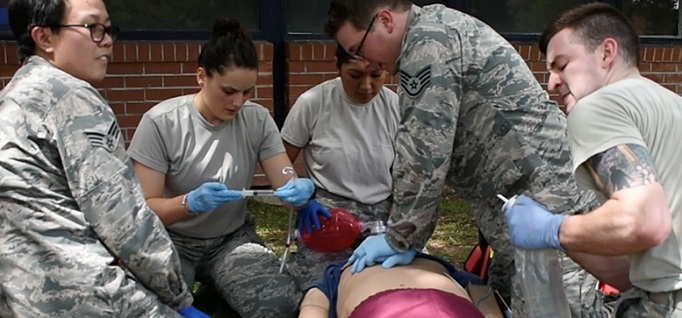A proven partnership in paramedics
By Jennifer Dubin
May 19, 2021
A partnership between Pima Community College and the U.S. Air Force to expand a high-quality paramedic program and prepare airmen and women for careers in the military and in civilian life can serve as a model for community colleges looking to collaborate with local employers to invest in workplace readiness.
In 2014, Pima Community College in Arizona won a five-year contract with the Air Force and the Air Force Medical Readiness Agency to offer an accelerated program to train 700 paramedics for the Air Force, which was facing a global shortfall in emergency medical services. In 2018, Pima won another five-year contract, which enabled the program to continue.
The college has a long history of working with local military partners, says Amanda Abens, Pima’s dean of workforce development and continuing education. It has offered educational services, including paramedic training and refresher courses, to service members at the nearby Davis-Monthan Air Force Base, and it has held trainings for the National Guard.
“We’ve always had a good relationship,” she said.
An accelerated model
With those collaborations in mind, Pima officials created a program in which two cohorts of 20 to 25 airmen participate in 560 hours of classroom instruction each year. Airmen also participate in a minimum of 500 hours of clinical and field experience working in local hospitals and ambulances.
Whereas most paramedic programs take six months to a year or more to complete, the airmen finish the program in four and a half months. The accelerated coursework, which meets National Emergency Medical Standards, enables graduates to quickly return to their home bases or new assignments where they are most needed. And it provides them with a civilian credential to use after they retire or separate from the Air Force.
“There is not one piece of the curriculum, one piece of the training that is skipped,” Abens said. “It’s just in a condensed time frame.”
All tuition, fees and other expenses are covered by the Air Force, and airmen come from across the country to enroll. Courses cover such subjects as anatomy, pharmacology and life support, and the program’s 30 to 50 workforce trainers are credentialed professionals, including paramedics, doctors and nurses, who work in the field.
Tapping local partners
To staff the program, Abens said the college has drawn on its longtime relationships with community partners, such as local fire departments and EMS agencies, whose professionals teach in the program’s clinical and vehicular rotations.
“Many of them are experts in specific areas like pediatric life support,” she said. “This allows us to give what we feel is the best, highest-quality training.”
In 2019, Pima also began offering a refresher course for paramedic recertification. The course entails 12 two-week classes of between 10 and 20 students. About 100 airmen and women are recertified through the program annually.
Ensuring student success
The program has resulted in high completion rates as well as exemplary passing rates on the National Registry of Emergency Medical Technicians (NREMT) credentialing exam. From October 2014 through September 2019, the dates of the initial contract, 216 of the 221 participants (97.7%) completed the program, and 212 of 216 participants (98.1%) passed their NREMT exam. The first-time attempt pass rate for the program was 96%, which exceeded the 2019 national average of 73%.
So far in the second contract, which began in December 2018 and ends in September 2023, 47 of 48 participants (97.9%) have completed the program, and 45 of 47 participants (95.7%) passed the NREMT exam. For this cohort, the first-time pass rate is 91.5%.
Besides these measures of success, student experiences and testimonials speak to the strength of the program. According to a report by the college, one graduate was credited with saving the life of a two-month-old infant experiencing cardiac arrest. Another graduate now in medical school emailed Pima officials thanking them for the program.
“The caliber of the training received is unsurpassed … it has far-reaching implications and will undoubtedly save the lives of U.S. servicemen and women for years to come,” he wrote.
There’s more to the story! Read the full article in CC Daily. And view the session on this topic on-demand at AACC Digital.



